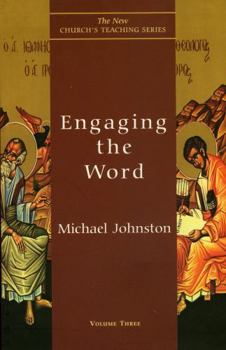Engaging the Word
Select Format
Select Condition 
Book Overview
Johnston introduces us to the key terms and concepts of biblical criticism that show us how to read Scripture on three key levels: the literal, historical, and prophetic.
Format:Paperback
Language:English
ISBN:1561011460
ISBN13:9781561011469
Release Date:January 1998
Publisher:Cowley Publications
Length:181 Pages
Weight:0.65 lbs.
Dimensions:0.5" x 5.5" x 8.4"
Customer Reviews
3 ratings
The word made real...
Published by Thriftbooks.com User , 20 years ago
The Episcopal church in the twentieth century took advantage of the general availability of publishing to good advantage, compiling through several auspices different collections and teaching series, the latest of which was only completed a few years ago. There have been 'unofficial' collections of teaching texts, such as the Anglican Studies Series by Morehouse press, put out in the 1980s, as well as an earlier teaching series. However, each generation approaches things anew; the New Church Teaching Series, published by Cowley Publications (a company operated as part of the ministry of the Society of St. John the Evangelist - SSJE - one of the religious/monastic communities in the Episcopal church, based in the Boston area) is the most recent series, and in its thirteen volumes, explores in depth and breadth the theology, history, liturgy, ethics, mission and more of the modern Anglican vision in America.This third volume, 'Engaging the Word' by Michael Johnston, picks up where second volume leaves off. Whereas Ferlo in the second volume looks at the Bible as a document in practice and development, Johnston's emphasis is on interpretation and meaning. The first several chapters of this look at narratives - stories. How does one tell the story? What are the important aspects of retelling the story, and of receiving the story? How do we adapt the story to our own situations and make it our own? There are key stories in the biblical text - the Abraham cycle, the story of the Exodus, the gospel stories of Jesus - identifying these and the worlds they came from are key steps. Re-reading to grasp aspects of community is also a critical step - Johnston uses the example of the gospel of John and the Johannine relationship with the more-dominant Jewish culture to show the complexities that can arise. These first three chapters can be considered strategy sessions. The next chapters look at methods and uses. Johnston discusses some of the more recent hermeneutic processes, as well as methods for tying things together to make general sense. These can then be turned to answering critical questions such as 'Who is God?' and 'Who is Jesus?' The key purpose to all of this is to build community and find the place of Jesus. In his epilogue, Johnston focuses upon two particular pieces from the Emmaus text (Luke 24:27 and Luke 24:30-31) that locate Jesus for us; we must also find and form ourselves in process with these.Anglicanism is sometimes accused of not taking the Bible seriously. Nothing could be further from the truth, as this text will indicate. The Anglican church requires no particular hermeneutical framework, nor any particular translation of the text to be used. However, this freedom is accompanied by the longer traditions of the church that give respect and authority to certain kinds of interpretation over others.Michael Johnston is an Episcopal priest who has taught Bible study and classes in lots of parish groups. He has also taug
Identifying the proper uses of the Bible
Published by Thriftbooks.com User , 22 years ago
This book, written primarily for Anglicans/Episcopalians, is a concise and wonderful answer to Christians who give the Bible too much prominence in their faith-life, those who are perhaps guilty of practicing "Bibliolatry." Without disrespecting the Good Book, Johnston speaks about the importance of reading the Bible within the context of a community of faith, and like communities of faith, the Bible is a living and ever-changing thing. I especially appreciated the distinction he draws between reading the Bible literally, historically, and prophetically. And anyone who considers the Bible to be a sacred text needs to read it in all three senses. Reading the Bible literally means to read exactly what's on the page (not to read into it things you remember for Sunday School or Christmas pageants)--to see it with fresh eyes. To read it historically means to be reasonably curious about the story behind the scene and to be willing to do a little background research to better understand the context of these ancient texts. And to explore the Bible in its prophetic sense is to be willing to understand what the text has to say about the way we apply the lessons of the Bible and live out our own lives today. One statement Johnston makes that I will continue to ponder for some time is, "Bible readers in Christian communities do not so much need experts as they do adepts, skilled readers who can both instruct and inspire with their own passion for the Bible" (p. 40).The last three chapters ("Who is the God of the Bible?", "Who is the Jesus of the Bible?", and "The Word as Sacrament") are especially thought-provoking. ENGAGING THE WORD is volume three in a twelve-part series called "The New Church's Teaching Series." Volume 2, OPENING THE BIBLE by Robert Ferlo, is also worth reading and deals with more practical issues about what Christians should know in order to begin a meaningful and satisfying practice of reading the Bible.
Helpful, but a bit dry
Published by Thriftbooks.com User , 24 years ago
This book is a very in-depth look at how to read scriptures. It has a lot of helpful information, but it's also somewhat boring. However, it is written for the general population and does not read like a textbook. The author suggests reading it with a bible at hand, and that is helpful. I'd recommend it to anyone who wants to learn a lot about how to really read scripture in depth.






